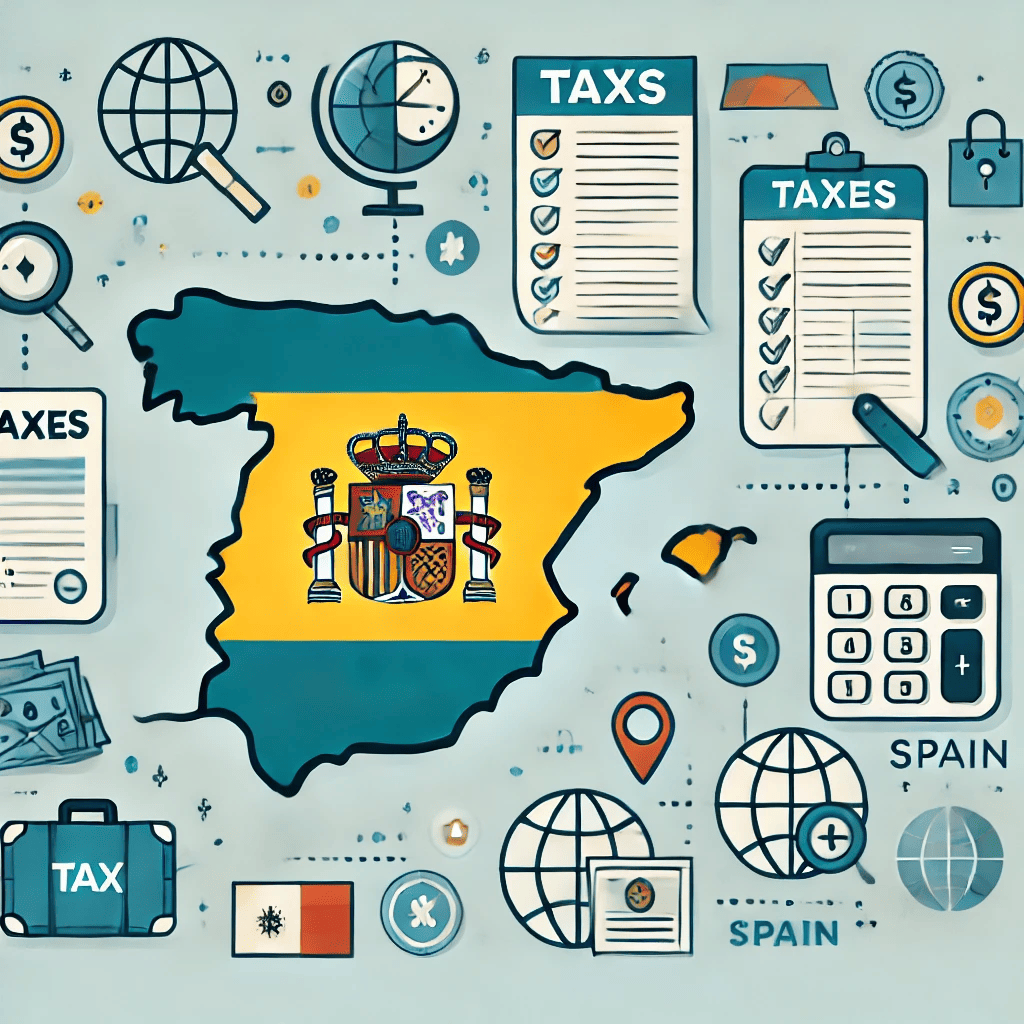Moving to Spain is an exciting adventure, but for many expats, the Spanish tax system can seem overwhelming. Navigating tax obligations is crucial to avoid penalties and ensure compliance with local laws. This guide will break down everything you need to know about taxes in Spain, including your residency status, tax rates, and the most common forms you’ll encounter as an expat.
1. Determining Your Tax Residency Status
In Spain, your tax obligations largely depend on whether you are considered a tax resident or non-resident. Here’s how it works:
- Tax Resident: You are considered a tax resident if you spend 183 days or more in Spain during a calendar year. Additionally, if your primary economic interests are in Spain, you may also be considered a resident, even if you spend fewer than 183 days in the country.
- Non-Resident: If you spend fewer than 183 days in Spain and do not have significant economic interests in the country, you are likely considered a non-resident.
Tax residency is important because residents are taxed on worldwide income, while non-residents are generally taxed only on Spanish-source income.
2. Income Tax (IRPF) for Residents
If you are a tax resident in Spain, your income will be taxed under the Personal Income Tax (IRPF) system. This tax is progressive, meaning the more you earn, the higher the tax rate.
- Tax Brackets for 2024:
- Up to €12,450: 19%
- €12,450 to €20,200: 24%
- €20,200 to €35,200: 30%
- €35,200 to €60,000: 37%
- €60,000 to €300,000: 45%
- Over €300,000: 47%
Additionally, there are regional differences in tax rates and deductions. Autonomous communities in Spain have the ability to adjust certain rates, so the tax burden may vary depending on where you live. For example, Madrid offers tax exemptions for wealth taxes.
3. Taxation on Foreign Income
As a tax resident, Spain taxes your worldwide income. This includes:
- Employment income: Income earned from your job, whether in Spain or abroad.
- Self-employment income: If you’re running a business or working as a freelancer in Spain.
- Rental income: Earnings from properties you own, either in Spain or abroad.
- Investment income: Dividends, interest, and capital gains.
Spain has tax treaties with many countries to avoid double taxation. If you’re paying taxes in your home country, you may be able to claim a tax credit or exemption in Spain for taxes already paid. Additionally, Spain offers the Expat Tax Regime (Beckham Law) to foreign workers who move to Spain for a limited period, offering reduced taxation on foreign income.
4. Social Security Contributions
In Spain, social security contributions are mandatory for both employees and self-employed individuals. These contributions cover benefits such as healthcare, unemployment insurance, and pensions.
- Employees contribute a percentage of their salary, which is typically withheld by their employer.
- Self-employed individuals (autónomos) pay their own contributions. The minimum monthly contribution is around €300, but self-employed individuals can choose a higher contribution base to increase their pension benefits.
5. Wealth Tax (Impuesto sobre el Patrimonio)
Spain imposes a wealth tax on individuals whose assets exceed a certain threshold. The threshold varies depending on the autonomous community, but generally:
- The general exemption is €700,000, with an additional €300,000 exempt for the primary residence.
- Wealth tax rates start at 0.2% and increase progressively up to 3.5% depending on the value of your assets.
Certain regions, like Madrid, offer full exemptions on wealth tax, which could be beneficial for some expats. Be sure to check the specific regulations in your region.
6. Property Taxes
If you own property in Spain, there are several taxes to be aware of:
- Impuesto sobre Bienes Inmuebles (IBI): This is a local property tax, paid annually based on the cadastral value of your property. Rates vary depending on the municipality.
- Capital Gains Tax on Property: If you sell a property and make a profit, the capital gains are subject to tax. The tax rate ranges from 19% to 23%, depending on the amount of the gain.
For non-residents, the tax rate on income from property is typically 24% (or 19% for EU citizens).
7. Inheritance and Gift Tax
If you inherit property or assets in Spain or receive a gift, you may be subject to the Inheritance and Gift Tax (Impuesto de Sucesiones y Donaciones). The tax rates and exemptions vary greatly depending on your relationship to the deceased or donor and the region where the assets are located.
- Close family members (spouse, children, etc.) generally benefit from higher exemptions and lower rates.
- Non-family members face higher taxes and lower exemptions.
Some regions, like Madrid, offer significant reductions or exemptions on inheritance tax for close relatives.
8. Filing Your Taxes in Spain
As a tax resident in Spain, you must file an annual tax return, typically between April and June for the previous year. If you’re employed, your employer may withhold taxes from your paycheck, but you’ll still need to file a return to ensure everything is correct and claim any deductions or credits.
If you’re self-employed, you’ll need to submit quarterly tax returns for VAT (IVA) and income tax (IRPF), and file a full annual tax return at the end of the year.
9. Common Tax Deductions and Credits
As an expat in Spain, there are several deductions you can claim, including:
- Personal deductions: For children, dependents, or being married.
- Pension contributions: Deductions for contributions to private pension schemes.
- Home ownership: Certain deductions for your primary residence, depending on the region.
Additionally, Spain has introduced tax breaks for individuals investing in energy-efficient housing and other environmentally sustainable initiatives.
10. Conclusion: Navigating Spanish Taxes as an Expat
Understanding and complying with the Spanish tax system is essential for all expats. Make sure to keep track of your income, expenses, and any changes in tax laws. It’s always advisable to consult with a local tax professional to ensure you’re meeting all your obligations and taking advantage of available deductions or exemptions.
By staying informed and organized, you can focus on enjoying your life in Spain without worrying about tax issues.

